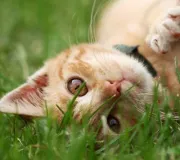If you are looking for a low maintenance pet for your Saint Lucie County home, a gerbil may be a good choice for you. These little creatures are quite friendly, playful, and curious. Gerbils do not require quite as much attention as a dog or cat, but they do have very specific needs. Like all pets, gerbils need the correct food, a proper and comfortable habitat, stimulation, and attention. For more information on caring for small rodents, see the article ‘Providing Quality Guinea Pig Care’.
Here are a few tips for caring for gerbils.
Housing
Gerbils are diggers by nature, and need a cage that can hold enough bedding for them to dig. Wire cages are not recommended, as bedding tends to spill out of them too easily. Aquariums are a better choice. Your gerbil’s home should be placed near a window, so they can get natural light. These cute little furballs can be quite the escape artists, so you’ll need to make sure the aquarium is very secure. A 10-gallon aquarium is recommended for one gerbil. Aquariums that use their space lengthwise rather than in height are better; gerbils are more interested in burrowing than climbing. Your gerbil’s home must be thoroughly cleaned out at least once a week. Any less, and ammonia can build up and make your little friend sick.
Toys
Gerbils are very active. Exercise wheels or balls are great choices. Just make sure they are safe for gerbils, as they can get their little tails or feet caught in open-wire wheels. Gerbils also love to chew. This is a natural instinct, which in the wild keeps their teeth from growing too long. Get your gerbil chew toys, but stay away from plastic. PVC pipe is a safe option.
Diet
Gerbils do best on a varied diet. You can use store-bought seed mixes or pellets, but be sure to supplement them with treats for variety. Fresh veggies or fruits, raisins, cereal, nuts, whole grain breads, little nibbles of cheese, bits of egg and even dog biscuits are all suitable treats.
Care
In order to keep your gerbil socialized, you’ll want to spend a bit of time playing with it daily. If you have more than one gerbil, a good rule of thumb is 15 minutes per gerbil. Constant attention will keep your gerbil happy and friendly, and keep it from losing interest in you.
Our Advice on Gerbil Care
What are the ideal housing conditions for a gerbil?
The ideal housing for a gerbil is a spacious aquarium that allows for ample bedding for digging, as gerbils are natural burrowers. A 10-gallon tank, preferably more horizontal than vertical, suits one gerbil well. Ensure the habitat is secure to prevent escapes, and place it near a window for natural light. Regular cleaning, at least weekly, is essential to prevent ammonia buildup and ensure a healthy environment. Avoid wire cages, as bedding spills out quickly.
Why are wire cages not recommended for gerbils?
Wire cages are not recommended for gerbils because their design can lead to bedding spillage and doesn’t support their natural burrowing behavior. The wire flooring can also harm their feet, potentially causing injuries or discomfort. Gerbils thrive in environments where they can dig and burrow freely, so an aquarium-type enclosure with deep bedding is a better choice to meet their instinctual needs and ensure their comfort and safety.
How often should a gerbil’s habitat be cleaned?
A gerbil’s habitat should be thoroughly cleaned at least once a week. Regular cleaning is crucial to prevent ammonia buildup from urine, which can harm their health. During cleaning, replace the bedding, sanitize the enclosure, and ensure all accessories are clean. This routine maintains a hygienic environment, reducing the risk of infections and ensuring the overall well-being of the gerbil.
What type of toys are best for gerbils?
The best toys for gerbils cater to their natural behaviors, such as chewing and digging. Safe chew toys made from wood, cardboard, or untreated wicker help keep their teeth in check. Exercise wheels or balls (with solid surfaces to protect tails and feet) provide physical activity. Tunnels or PVC pipes for exploration and hideouts also mimic their natural burrowing instincts. Always ensure toys are non-toxic and gerbil-safe to prevent any health hazards.
What are the specific needs of gerbils as pets?
Gerbils, as pets, require a spacious, secure enclosure with deep bedding for burrowing. They need a balanced diet of gerbil-specific food and occasional fresh fruits and vegetables. Providing chew toys and exercise options like wheels or tunnels is essential for their physical and mental well-being. Gerbils also thrive on social interaction, either with another gerbil or through regular, gentle handling by their owners. Regular cleaning of their habitat and access to fresh water are also crucial for maintaining their health.
Gerbils can make great pets, and can be a fun and cute addition to your Saint Lucie County household. For comprehensive check-ups and health management, consider ‘Vet Preventive Care’ services from our clinic. Contact us, your local animal clinic in Treasure Coast, FL!

